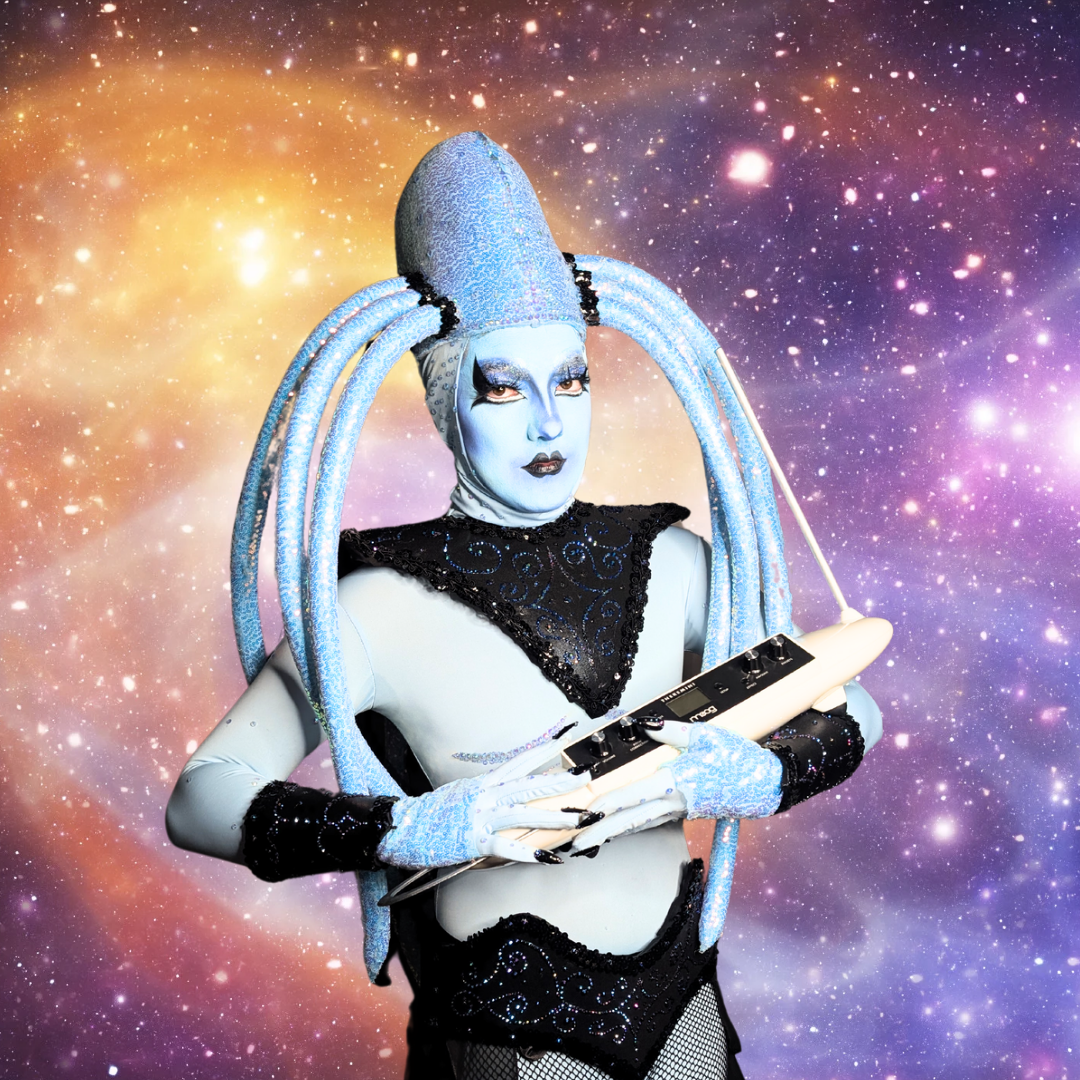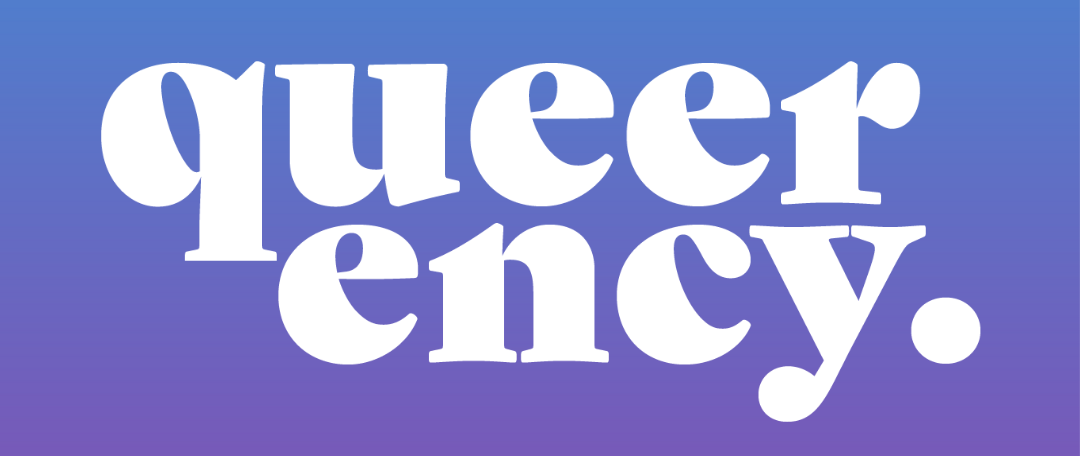Sacramento-based drag and burlesque performer Libra Longlegs is known for their kaleidoscopic artistry, expressing elements of a drag king, drag queen, and beyond.
We chatted with them about how drag helped them discover their gender identity, juggling performance and entrepreneurship, and why they say the best target audience is the inner child.
I want to start off with an introduction to you as a drag performer—how you got started and where the transition was between not doing drag, to doing drag, and then how it progressed into a profession?
I technically started doing drag when I was 18. It was more of a community thing with my college and campus pride events and fundraisers for things like gender affirming bathrooms and PFLAG parents and lots of community outreach things.
At the time it was more of a hobby and I was also very much still in the closet. I was still identifying as a cisgender straight woman who was also still Christian. I was living in Placer County, which is the most conservative part of California next to Orange County. Drag started as something that gave me permission once or twice a year to explore my gender and express my gender in a different way.
That’s kind of how it was for a very long time; it was not a money making venture. Maybe I would get a dollar or something but it really was what helped me understand my own gender identity. Fast forward to today–over a decade later–I’m living as a post-op transmasc non-binary person. I have a lot of credit to give to drag for that. I know there’s that cliché that drag finds you when you need it most.
It wasn’t until 2021 that I started doing drag on the scene, as they call it. One of my friends reached out and was like “Hey, we need to get you into the clubs.” And they told me about this show called “Fuck Tuesday, Let’s Party.” It was an amateur night for drag performers. That’s when I started to realize that the drag industry, at least in Sacramento, is very much about social networking. Obviously talent and artistry is important, but if you don’t know the people running the shows, how are they going to know to book you?
That really changed my perspective because I’ve been an entrepreneur since 2021, when I started my business, Lavender Mint Media, where I do virtual assistant work for queer business owners. I feel like right now I’m in this in-between where I’m not as established as a performer, but I’m definitely not a newbie. But drag is definitely a good source of supplemental income for me. It’s helped me buy groceries and fund more drag projects.
So what does that mean for you in terms of schedule?
Fortunately I’m already a night owl, so the nice thing about my business is that I have the flexibility to also do drag. When I was working a traditional nine-to-five it was really frustrating, especially when I was living in more conservative areas asking for time off for a drag show.
Now I can get my client work done whenever I want and I can schedule my drag shows whenever I want. As far as that goes, it really fluctuates. I warn everybody that in October I’m not as available, because October is gay Christmas.
And that’s not the case for all drag performers. I consider myself more of a spooky drag thing. October is my favorite time of the year; it’s when I have the most gigs, second to Pride month. But an average month for me is probably at least six shows.

At a glance, your performance contains elements of drag “king” as well as drag “queen” and everything in between. How do you define yourself as a performer with a diverse expression such as yours?
I consider myself a drag thing or drag entity, or even a drag creature. When I think about the idea that I have to be a drag queen it kind of makes me feel like I’m putting myself back in that box of ideal femininity, which is something I internalized a lot being raised AFAB in such a conservative area. But then drag king also feels limiting because it’s not that I dislike being masculine or feminine, it’s just that I don’t want to feel like I have to pick one or the other. I like the fluidity of just having an idea and bringing it to life regardless of the gender presentation.
I love the Fifth Element Diva with top surgery scars.
The timing of that felt very potent after the whole transgender aliens having surgeries thing. So I’m like, yeah this is our agenda.
“Drag thing” and “drag creature” really resonate with me. I like being a shapeshifter and it’s also about being playful. It really taps into that inner child piece of wanting to play dress up and how those things aren’t necessarily gendered. A lot of my projects involve giving that younger version of me the permission to do everything that they weren’t allowed to and wearing whatever they want and dancing to whatever music they want, even if it’s got some bad words in it.
I feel like we’re brainwashed by RuPaul’s Drag Race to be “branding, branding, branding.” Everything has to be super consistent and you have to be known for one catchphrase. You’re an example of someone who’s a successful drag performer who has a variable expression. Do find that’s something that’s an asset, or do you find that people who book shows are looking for something more consistent?
That’s been a challenging topic in our scene because I know it varies from city to city, state to state. I’ve heard “this state only books queens” or “in this city they don’t book kings or non-binary performers.” So that’s kind of an ongoing conversation we’re having right now and I’ve definitely experienced that. I want to be careful about how I say this because I don’t want people to think I’m talking shit, but it’s just like any other scene. There can be cliques, there can be drama; things can feel a bit high school.
I don’t think I’ve necessarily been discriminated against, but if I have, I guess I don’t know. I just like to think that if I keep being myself and keep being unique, the right people who want me at their shows are going to see that and they’re going to book me accordingly. That’s the thing with art. You’re not going to be everyone’s cup of tea and you don’t want to be everybody’s cup of tea.
But representation is a challenge. Misogyny in the queer community is a challenge. Transphobia is a challenge. So it’s something we have to keep talking about.

What’s something you wish you knew when you were just starting out?
Something I wish I knew before getting started performing is about boundaries and not being a people pleaser. Learn how to set boundaries, but also that might bring up some issues around trauma and people pleasing. Why are you a people pleaser? That journey alone will take you down a rabbit hole. If you need to get therapy or learn some somatic practices so you can understand what a “yes” feels like in your body, because unfortunately there are predatory people out there. The performing arts scene is amazing and there can be an exploitative side to it.
Keeping a good head on your shoulders and not being afraid to say “no.” Not every opportunity is the right opportunity because of your schedule and workload.
When it comes to the artistry, I say really think about what your younger kid version of you felt afraid or embarrassed to express and multiply that by a thousand. Come up with creative ways to bring that to life—that’s where the authentic artistry comes through.




